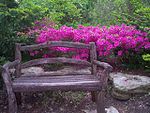Adair–Austin Stadium
American football venues in KansasBuildings and structures in Wichita, KansasCollege football venuesFriends Falcons footballSports venues in Kansas

Adair–Austin Stadium is a sport stadium on the campus of Friends University in Wichita, Kansas. The facility is primarily used by the Friends University Falcons football, soccer, and track and field teams. The stadium is also used for other community events.
Excerpt from the Wikipedia article Adair–Austin Stadium (License: CC BY-SA 3.0, Authors, Images).Adair–Austin Stadium
South Saint Clair Street, Wichita
Geographical coordinates (GPS) Address Nearby Places Show on map
Geographical coordinates (GPS)
| Latitude | Longitude |
|---|---|
| N 37.678333333333 ° | E -97.368611111111 ° |
Address
Adair-Austin Stadium
South Saint Clair Street
67213 Wichita
Kansas, United States
Open on Google Maps




